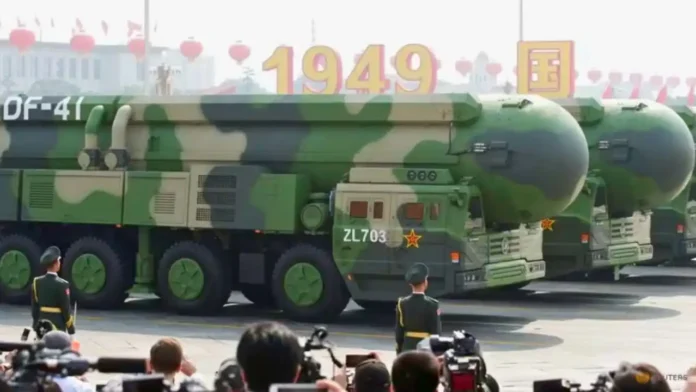In a bold and historic move, China test-fired an intercontinental ballistic missile (ICBM) for the first time in more than four decades, reigniting global attention towards its evolving military capabilities.
The People’s Liberation Army Rocket Force launched the missile carrying a dummy warhead at precisely 8:44 am local time (04:44 GMT). The missile soared across the sky before descending into a pre-designated zone of the Pacific Ocean, marking the first time since 1980 that China has conducted such a test into international waters.
This groundbreaking ICBM test, executed as part of China’s annual military drills, comes at a time of growing tension in the Asia-Pacific region, raising concerns among global powers. Chinese defense officials have classified the test as a “routine” exercise, asserting that relevant countries had been informed prior to the launch to avoid any escalation.
Despite these reassurances, military analysts have flagged this event as highly unusual, primarily due to the rarity of China’s ICBM tests outside of its own territorial boundaries.
The test has sparked significant debate within the international defense community, with Ankit Panda, a prominent nuclear weapons expert from the Carnegie Endowment for International Peace, questioning China’s characterization of the launch as part of their “annual military training.”
Panda noted, “The claim of routine testing is misleading as such intercontinental ballistic missile tests haven’t occurred frequently in recent decades.” Indeed, China’s missile testing has historically been limited to within its own borders, making this international launch a striking deviation from its typical military conduct.
Although details about the missile, such as its model, trajectory, and technical specifications, remain undisclosed, China’s defense ministry promptly emphasized that the test complied with international regulations and was not directed at any specific country.
The timing of this test, however, comes at a period of escalated tensions between China and several key players in the region, including Japan and Taiwan. Furthermore, the test follows China’s decision in July to suspend nuclear arms discussions with the United States, citing frustrations over US arms sales to Taiwan—a move that has significantly strained diplomatic relations.
In response to the missile launch, Japan’s government has confirmed that no damage was sustained from the missile’s flight. While it did not traverse Japanese airspace, the test has nevertheless heightened concerns over China’s military expansion and the potential for further provocations in the region.
Yoshimasa Hayashi, Japan’s Chief Cabinet Secretary, addressed these concerns in a press conference, where he expressed the nation’s growing unease over China’s lack of transparency in military activities. “We are seeing an increase in Chinese military maneuvers around our borders, and this test only adds to our concerns over their rapid expansion,” Hayashi remarked.
China’s ICBM launch signals a shift in its military strategy, reinforcing its role as a global power while underscoring its readiness to project its influence far beyond its traditional borders.
This event will likely lead to further scrutiny of China’s military policies and its position within the international community, particularly as tensions with the United States, Japan, and Taiwan continue to mount.
As the geopolitical landscape of the Asia-Pacific grows increasingly complex, this ICBM test could mark the beginning of a new era in military and diplomatic relations, one where China asserts itself as a dominant force in the region.
For now, the world watches closely to see how China’s military trajectory unfolds and how neighboring nations, particularly those in the Pacific, will respond to this bold and historic missile launch.




